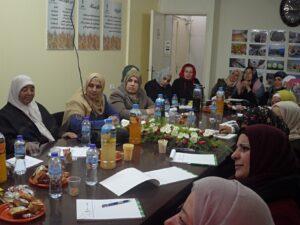Palestinian Women Develop Cooperatives and Self-Determination
Under Israeli occupation, Palestinians have suffered as their lands and water resources are confiscated, homes are destroyed and free movement within Palestine threatened. Palestinian’s lack of autonomy over their own resources creates shortages in food, shelter and employment leaving communities in poverty. This is why Grassroots International has supported the Union of Agriculture Work Committees’ (UAWC) Women’s Empowerment Project (WEP): Economic Empowerment through Cooperatives.
According to the United Nations Development Programme, 25.8% of Palestinians live in poverty and around 13% of the population lives in “deep poverty,” which is defined by a monthly income of $509 to pay for living necessities. The percentage of people living in poverty is exacerbated by the occupation that marginalizes Palestinian residents of their rights to their own resources. The WEP is focused on solving the issues of poverty by providing women with the proper resources that are necessary to produce and market goods through the formation of local cooperatives.
This year the WEP supports recent women graduates from Birzeit University to start their own cooperative that will sell goods at the UAWC’s store Bas Baladi (which means “local only” in Arabic) and at a storefront near the university. Through the WEP, UAWC will provide these young women with access to seedlings for agricultural production and education on various farming tools. Additionally because of the WEP, the female graduates will produce a steady flow of nourishing, sustainably produced food that will benefit their communities.
Traditionally, foreign aid has focused on addressing the short-term issue of hunger by sending in imported food, failing to realize that this plan leaves Palestinians dependent on aid over the long-term. Not only is the importation of food harmful for Palestinian communities in the long run, but also foreign aid does not ensure a proper solution to the reality that only one in four families live in food security. Therefore, the WEP builds a foundation of food sovereignty among Palestinian communities by educating youth to grow culturally appropriate crops on their own land and to sell the food to their own people.
Another important aspect of the WEP, aside from the advocacy for food sovereignty, is the empowerment of Palestinian women by granting them control over the local cooperatives. From birth, Palestinian women are marginalized because of the ideals that are upheld in the patriarchal society in which they live. This disenfranchisement of women within specifics realms of society is evident through research done by the United Nations showing that 69.1% of men are employed, in comparison to a meager 17.4% of Palestinian women who are able to participate in the work force. Handing over control and marketing of agricultural production to women paves a different way for how communities can view the role of women.

Through workshops the UAWC teaches women how to manage the cooperatives, and provides leadership skills that equip the women to voice their opinions in all aspects of civic life. Not only do women take roles as leaders of the community, but they also establish their self-sufficiency by supporting themselves and their families through the steady income generated through the cooperatives.
The creation of a small, female-led cooperatives serves as an incremental step for Palestinians’ self-determination and provides a way to peacefully resist the occupation. The cooperative sets up a model for sustainable livelihoods by providing communities with healthy, culturally appropriate food, women with access to employment, and Palestine’s own long-term path to independence from foreign aid.
A new generation of women leaders is on the rise who have experienced an increased role in political and economic spheres by participating in the agricultural cooperatives. The WEP gives Palestine a new way to address the issues of widespread hunger and poverty with the end goal of one day declaring itself free from the bonds of Israeli occupation.
———————————–
Christina Obolenskaya has been volunteering for Grassroots International since October 2016. She is a current undergraduate student at Wellesley College, and is looking to major in International Affairs with a focus on Political Science.
